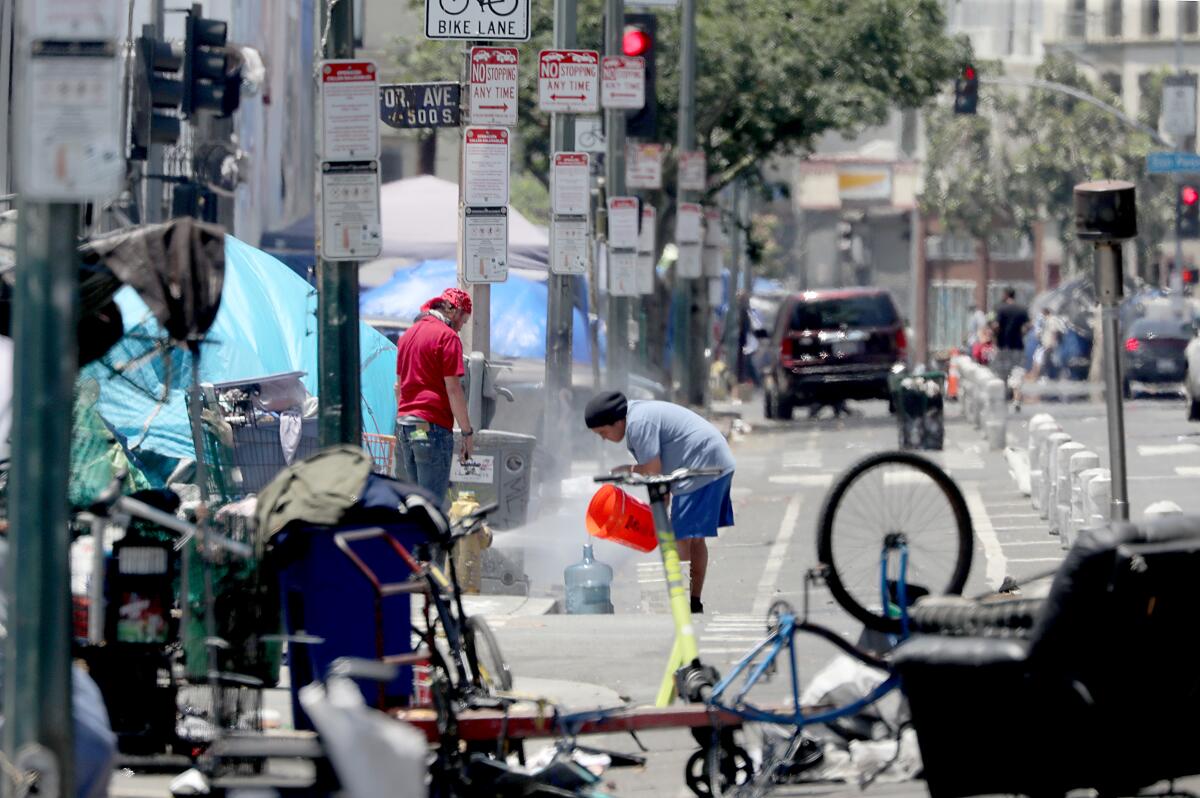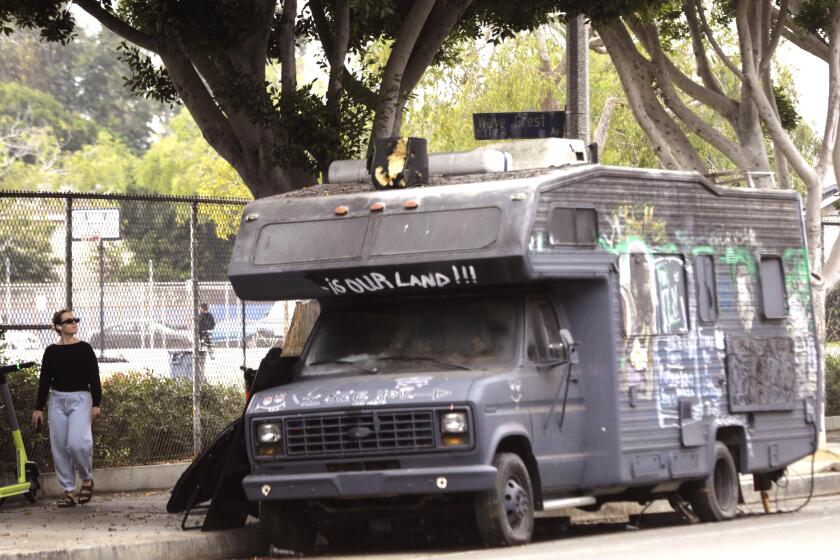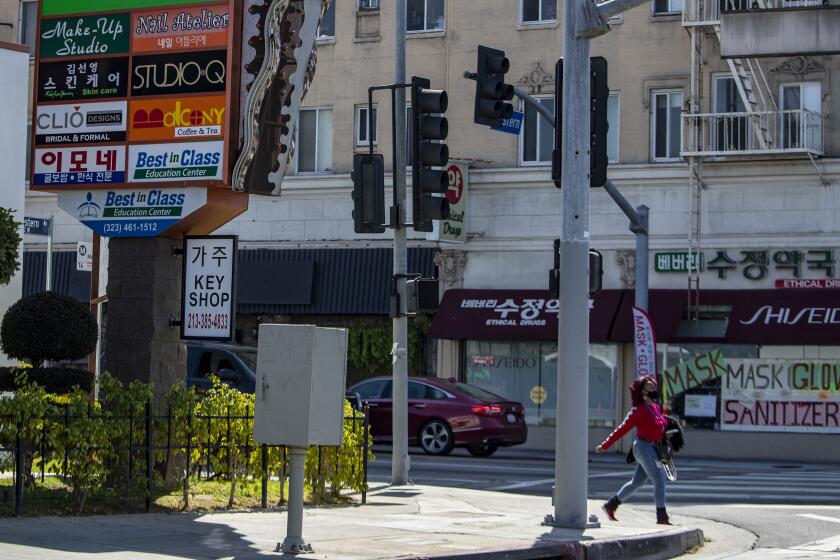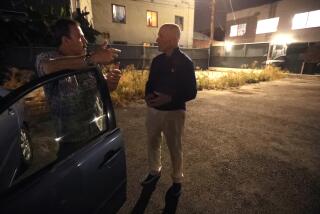Opinion: I run an L.A. homeless services organization. But I can’t afford to live in L.A. anymore

- Share via
In August, my family’s Los Angeles landlord served us with a 60-day notice to vacate. The landlord cited the city’s municipal code for just cause evictions, which include allowing tenants to be evicted if the landlord or members of their family will now be occupying the space.
This is the second time in three and a half years we’ve been served with this kind of notice. But this time, because of the double whammy of the housing affordability crisis in Los Angeles and the lack of housing security, my family isn’t looking for another place here — we’re leaving for my home state of Indiana, and I’ll soon have to leave my job.
The irony of all this is that for more than 10 years my job has been to help prevent homelessness for vulnerable Angelenos.
A majority of unhoused people in Los Angeles County live in cars, trucks or RVs. Some of them have income, just not enough to afford both rent and food.
After I first moved to L.A. in 2011 (renting a room in Silver Lake for $450 a month), I began volunteering downtown for groups that provided meals and other services to the city’s unhoused population. I became fascinated by the personal stories I heard from the people I met doing this and also on the streets of downtown and Hollywood. What struck me most was the chronic isolation that people experiencing homelessness faced, often living with persistent health challenges and without a stable community to rely on.
In 2013, I got a job at the Center in Hollywood, a homeless services nonprofit. I was drawn to the Center because, along with its work doing outreach and helping those in need find permanent housing, its central focus was on creating safe space and building relationships with unhoused people. Arts workshops, poetry, music and even “The X-Files” episodes were ways to engage conversation, building trust and community.
The ‘house burden’ metric that compares income to shelter costs goes a long way toward explaining Southern California’s housing crisis.
I found meaning in the work and seeing the effects it could have. One regular participant, Mark, sat daily in groups but never said a word. This went on for more than a year. Then, one day something in a group discussion sparked Mark’s fascination, and his voice. Mark is now a regular client at the Center’s on-site clinic. He and I talk football now and then, and just last year he initiated conversations with our team about housing.
Though meaningful and important, work in homeless services is hard, the pay is low and the lack of housing security for those who do it has led to many leaving California to avoid the risk of becoming unhoused themselves. Years ago, I was speaking with an elected official’s senior staff and warned them of the dire future facing service workers in this sector. I predicted that many experts would end up leaving the field and moving away out of necessity.
In the time since this conversation, little has been done to curb this reality. According to some estimates, California lost a net 340,000 residents between 2021 and 2022. I have seen at least 25 friends move out of state, some of whom were among the Center’s staff. It pains me to join them, but my family and I want to buy a home someday, which won’t be possible for us here.
We were first-generation Latina home buyers seeking to get our family out of a crowded 450-foot apartment. Here’s how our housing search went.
L.A.’s elected officials have declared that solving the homelessness crisis is a priority, yet the work to do this takes time, care and the dedication of people who work at places like the Center. If we can’t afford to live here ourselves, we can’t help the unhoused population we want to serve.
This is a challenge that people working in homeless services face across the nation. A colleague of mine will be speaking on it at a conference next year. When I have attended events like these, Los Angeles is often pointed to as a beacon of innovation on the issue of poverty alleviation. Officials here need to use that innovation and recognize that solving the homelessness crisis includes ensuring that the people working to help our unhoused population have the means to live here.
Mark still does not have permanent housing, but he comes to the Center every day. He is known, cared for and has built trust with the people there, which is essential for his stability when he does get his own apartment. It is hard for me to say goodbye to him and to this community, but in Indiana my family and I will be closer to other loved ones, and we will eventually be able to afford a home while I continue working to help others find housing, ideally at a place where we can expand on the model set by the Center.
My family and I may not be able to stay here, but I hope the city’s leaders will prioritize this challenge so that others who work to help its unhoused population can continue to make Los Angeles their home.
Nathan Sheets is the executive director of the Center in Hollywood.
More to Read
A cure for the common opinion
Get thought-provoking perspectives with our weekly newsletter.
You may occasionally receive promotional content from the Los Angeles Times.













